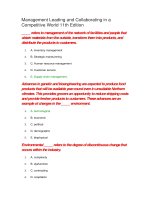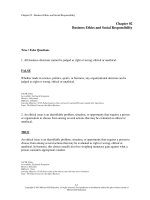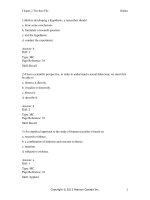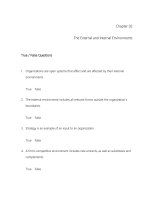Human sexuality in a changing world 10th edition by rathus nevid rathus test bank
Bạn đang xem bản rút gọn của tài liệu. Xem và tải ngay bản đầy đủ của tài liệu tại đây (381.19 KB, 16 trang )
Human Sexuality in a Changing World 10th edition by Spencer A. Rathus, Jeffrey S.
Nevid, Lois Fichner-Rathus Test Bank
Link full download test bank: />Link full dowload solution manual: />Chapter 2: Female Sexual Anatomy and Physiology
2.1 Multiple Choice
1) Another term for the vulva is
A) veneris.
B) pudendum.
C) vagina.
D) labia.
Answer: B
Page Ref: 41
Skill: Factual
2) Which of the following is the technically correct way to refer to a woman’s frontal
genitalia? A) Vagina
B) Vulva C)
Perineum
D) Enchanted castle
Answer: B
Page Ref: 41
Skill: Applied
3) Which of the following correctly lists the order of a woman’s external genital structures from
uppermost to lowermost (if the woman is seated)?
A) Perineum, clitoris, vaginal opening, urethral opening, prepuce B)
Prepuce, clitoris, vaginal opening, urethral opening, perineum C)
Mons veneris, clitoris, urethral opening, vaginal opening, prepuce D)
Mons veneris, clitoris, urethral opening, vaginal opening, perineum
Answer: D
Page Ref: 42
Skill: Applied
4) The female structure that consists of fatty tissues that covers the pubic bones in front of
the body is(are)
A) mons veneris.
B) labia majora.
C) vulva.
D) labia minora.
Answer: A Page
Ref: 42 Skill:
Factual
5) The outermost folds of skin that protect the inner female genitalia are known as
A) the prepuce.
B) labia minora.
1
Copyright © 2018, 2014, 2011 Pearson Education, Inc. All rights reserved.
C) labia majora.
D) mons
veneris. Answer:
C Page Ref: 42
Skill: Factual
6) Which of the following is the normal appearance of the labia majora?
A) They may be thick or thin, pronounced or flat, noticeable or less noticeable; all are
normal variations.
B) They are usually thick, pronounced, and noticeable as folds of skin.
C) They are usually thin, flat, and not very noticeable as folds unless pulled apart.
D) They are usually hairless, light-colored membranes of tissue around the vaginal opening.
Answer: A
Page Ref: 42
Skill: Applied
7) The labia majora
A) are large fleshy folds of skin on each side of the vaginal opening.
B) come together to form the prepuce.
C) are thinner, inner folds of flesh just outside the vaginal opening.
D) have many nerve endings and are primary sources of sexual
stimulations. Answer: A
Page Ref: 42
Skill: Factual
8) The sexually sensitive smooth, hairless, inner lips of the vulva are
called A) clitoris.
B) crura.
C) labia majora.
D) labia minora.
Answer: D Page
Ref: 43 Skill:
Factual
9) Which of the following join at the hood of the clitoris?
A) Introitus
B) Mons veneris
C) The prepuce
D) Labia
minora Answer:
D Page Ref: 43
Skill: Factual
10) During sexual stimulation, the labia minora
may A) become firm and longer.
B) become white and rubbery.
2
Copyright © 2018, 2014, 2011 Pearson Education, Inc. All rights reserved.
C) darken and swell.
D) secrete sex
hormones. Answer: C
Page Ref: 43
Skill: Factual
11) The sex organ whose only known function is to provide pleasure is
A) the vagina.
B) the clitoris.
C) the prepuce.
D) mons
veneris. Answer:
B Page Ref: 43
Skill: Factual
12) A clear difference between the clitoris and the penis is that the clitoris has
A) no known function other than sexual pleasure.
B) no cover that is equivalent to the penis’
foreskin. C) no erectile properties.
D) the ability to ejaculate.
Answer: A
Page Ref: 43
Skill: Conceptual
13) The sheath of skin, or hood, that covers the clitoral shaft is known as the
A) prepuce.
B) pudendum.
C) labia majora.
D) swathe.
Answer: A Page
Ref: 43 Skill:
Factual
14) Which of the following correctly describes the relation between the clitoris and the
male penis?
A) They are analogous.
B) They are unrelated. C)
They are homologous.
D) The clitoris is a small
penis. Answer: C
Page Ref: 44
Skill: Conceptual
15) The clitoral shaft consists of erectile tissue that contains two spongy masses called
A) clitoral glans.
B) corpora cavernosa.
3
Copyright © 2018, 2014, 2011 Pearson Education, Inc. All rights reserved.
C) sphincters.
D) vestibular bulbs.
Answer: B
Page Ref: 43
Skill: Factual
16) The tissue that partially or fully covers the glans of the clitoris is the
A) mons veneris.
B) labia minora.
C) urethral hood.
D) clitoral hood or prepuce.
Answer: D
Page Ref: 43
Skill: Factual
17) The clitoris responds to sexual stimulation by
A) releasing sexually stimulating hormones.
B) widening and turning red.
C) engorging with blood.
D) withdrawing inside the woman’s abdomen.
Answer: C
Page Ref: 43
Skill: Factual
18) A rite of initiation into womanhood in many Islamic cultures consists
of A) a large family celebration.
B) removal of the clitoris.
C) the meeting of her chosen husband.
D) receiving a symbolic tattoo in the genital
area. Answer: B
Page Ref: 44
Skill: Applied
19) The area between a woman’s labia minora is referred to as the
A) vestibule.
B) vagina.
C) urethra.
D) prepuce.
Answer: A
Page Ref: 44
Skill: Factual
20) The area on a woman’s body that contains the openings to the vagina and urethra is the
A) vaginal opening.
B) vulva. C)
vestibule.
4
Copyright © 2018, 2014, 2011 Pearson Education, Inc. All rights reserved.
D) introitus.
Answer: C
Page Ref: 44
Skill: Factual
21) Women pass urine from
A) the urethra, which empties into the vagina.
B) the urethral opening below the vaginal opening.
C) the urethral opening, which is the vagina.
D) the urethral opening above the vaginal opening.
Answer: D
Page Ref: 45
Skill: Applied
22) Urine passes from the female’s body through
the A) fallopian tubes.
B) urethral opening.
C) vaginal opening.
D) ureter.
Answer: B
Page Ref: 45
Skill: Factual
23) Cystitis is a
A) bladder inflammation.
B) calcium build up in the vulva.
C) vaginal infection.
D) painful period.
Answer: A
Page Ref: 46
Skill: Factual
24) A good friend of yours tells you she is experiencing painful and frequent urination and
bloody discharge. She is likely to have
A) menarche.
B) cervical
cancer. C) cystitis
D) premenstrual syndrome.
Answer: C
Page Ref: 46
Skill: Applied
25) Proponents of the practice claim that removal of the clitoris is an attempt to
A) create sexual desires.
B) announce the female’s womanhood.
C) remove evil spirits.
5
Copyright © 2018, 2014, 2011 Pearson Education, Inc. All rights reserved.
D) ensure chastity.
Answer: D
Page Ref: 44
Skill: Applied
26) All of the following statements regarding the clitoridectomies are true,
except A) the typical woman assumes it is a part of being female.
B) it is usually done by women.
C) the Islamic bible does not authorize it.
D) the labia minora and majora are also
removed. Answer: D
Page Ref: 44
Skill: Applied
27) Which of the following is not a medical complication due to the
clitoridectomy? A) Infections
B) Painful menstruation
C) Headaches
D) Obstructed labor
Answer: C
Page Ref: 45
Skill: Applied
28) The female circumcision that involves complete removal of the clitoris along with the
labia minora and inner layers of the labia majora is called
A) excision.
B) Farsic circumcision. C)
Sudan circumcision. D)
radical clitoridectomy.
Answer: A
Page Ref: 45
Skill: Applied
29) Which of the following statements is true regarding genital mutilation?
A) It is only legal in the United States if the female signs an informed consent form.
B) The United States bans the practice and advocates bringing an end to the practice.
C) Clitoridectomies are not common in African countries.
D) Genital mutilations have been outlawed in the United States for over 15
years. Answer: B
Page Ref: 45
Skill: Applied
30) In order to help prevent cystitis, it is recommended that
women A) drink plenty of caffeine.
B) avoid acidic beverages like orange juice.
C) avoid the use of vaginal lubricants.
6
Copyright © 2018, 2014, 2011 Pearson Education, Inc. All rights reserved.
D) urinate after
intercourse. Answer: D
Page Ref: 46
Skill: Applied
31) The vaginal opening is called the
A) introitus.
B) prepuce. C)
pudendum. D)
labia interna.
Answer: A Page
Ref: 46 Skill:
Factual
32) The ring of tissue that partially or fully covers the vaginal opening is the
A) clitoris.
B) cervix. C)
perineum. D)
hymen.
Answer: D
Page Ref: 46
Skill: Factual
33) The hymen or maidenhead is
A) proof of virginity.
B) a fold of tissue across the vaginal opening.
C) evidence of sexual intercourse.
D) present until a woman gives birth.
Answer: B
Page Ref: 46
Skill: Factual
34) A common myth about the female hymen is that
A) sperm cells can pass around the hymen.
B) the hymen will always break and bleed during first
intercourse. C) some females are born without a hymen.
D) tampon insertion may perforate a
hymen. Answer: B
Page Ref: 46
Skill: Factual
35) All of the following are reasons that the hymen is a poor indicator of virginity,
except A) the hymen may be torn by non-sexual activities.
B) a flexible hymen may not rupture during intercourse.
C) small penises may not rupture a typical hymen.
D) women can stretch their hymen so it does not rupture painfully.
7
Copyright © 2018, 2014, 2011 Pearson Education, Inc. All rights reserved.
Answer: C
Page Ref: 47
Skill: Conceptual
36) Under what condition might it be necessary for a woman to have her hymen
surgically incised (cut)?
A) An imperforate hymen
B) A porous hymen
C) A septate hymen D)
A cribriform hymen
Answer: A
Page Ref: 47
Skill: Factual
37) When the hymen is almost completely, or completely, closed, it is called
A) a blocked hymen.
B) a fractious hymen.
C) an imperforate hymen.
D) a stringent hymen.
Answer: C
Page Ref: 47
Skill: Factual
38) Which of the following statements is true based on cross-species comparisons of female
sexual structures?
A) The hymen is usually found in females in most species of mammal and in many birds.
B) The hymen is found only in the great apes and in humans.
C) The hymen is found in most mammals, but has no known function.
D) The hymen is not present in other primates and has no known
function. Answer: D
Page Ref: 47
Skill: Factual
39) The skin and tissue between the vaginal opening and the anus is called the
A) perineum.
B) prepuce.
C) imperforate.
D) episiotomy.
Answer: A
Page Ref: 47
Skill: Factual
40) The wing-shaped, leg-like structures that attach the clitoris to the pubic bone are
called A) corpora cavernosa.
B) clitoral crura.
C) pubic-clitoral attachments.
8
Copyright © 2018, 2014, 2011 Pearson Education, Inc. All rights reserved.
D) clitoral bulbs.
Answer: B Page
Ref: 47 Skill:
Factual
41) The vestibular bulbs and Bartholin’s glands
are A) muscular rings.
B) corpora cavernosa.
C) active during sexual arousal.
D) essential for vaginal
lubrication. Answer: C
Page Ref: 47–48
Skill: Conceptual
42) The fluid of the Bartholin’s glands
A) provides vaginal lubrication.
B) causes engorgement of vaginal tissues.
C) causes a form of sweating in the vagina.
D) has no known purpose.
Answer: D
Page Ref: 48
Skill: Conceptual
43) All of the following are functions of the vagina,
except A) menstrual flow.
B) passing babies.
C) accepting the penis during coitus.
D) urine flow.
Answer: D
Page Ref: 48
Skill: Conceptual
44) The vagina is
A) like a rigid muscular tube at rest.
B) usually only two inches long at rest.
C) only able to expand in width during sexual arousal or childbirth.
D) able to expand in length and width during sexual
arousal. Answer: D
Page Ref: 49
Skill: Factual
45) All of the following are true of the vaginal walls, except
A) they have three layers.
B) the moisture level may vary for individuals.
C) they are rich with blood vessels.
D) they are richly supplied with nerve endings.
9
Copyright © 2018, 2014, 2011 Pearson Education, Inc. All rights reserved.
Answer: D
Page Ref: 49
Skill: Conceptual
46) Douching and vaginal sprays
A) are recommended for proper hygiene.
B) are generally ineffective.
C) can restore the natural chemical balance in the vagina.
D) can irritate the vagina.
Answer: D
Page Ref: 50
Skill: Applied
47) The Grafenberg spot is said to be located
A) in the left wall of the vaginal canal (from a woman’s perspective).
B) in the anterior (front) wall of the vagina.
C) in the posterior (back) wall of the vagina.
D) in the back of the vagina just below the cervix.
Answer: B
Page Ref: 49
Skill: Factual
48) All of the following are true of vaginitis, except
A) vaginitis can only be prevented with antibiotics.
B) vaginitis means vaginal inflammation.
C) vaginitis may be caused by birth control pills.
D) vaginitis may be involve abnormal discharge from the
vagina. Answer: A
Page Ref: 50
Skill: Applied
49) The lower end of the uterus that connects it to the vagina is the
A) cervix.
B) perineum.
C) endometrium.
D) fallopian tube.
Answer: A Page
Ref: 51 Skill:
Factual
50) All of the following are true of the cervix, except
A) its secretions contribute to the chemical balance of the vagina.
B) it expands in length during sexual arousal.
C) it expands to permit passage of a baby.
D) sperm pass through the cervical canal.
Answer: B
10
Copyright © 2018, 2014, 2011 Pearson Education, Inc. All rights reserved.
Page Ref: 51
Skill: Conceptual
2.2 True/False
1) The term pudendum refers to female external genitals.
Answer: True
Page Ref: 41
Skill: Factual
2) The skin of the labia majora is typically darker than the surrounding skin of the thighs.
Answer: True
Page Ref: 42
Skill: Factual
3) The labia minora merge at the hood of the clitoris.
Answer: True
Page Ref: 43
Skill: Factual
4) The tissue that partially covers the clitoral glans is the mons veneris.
Answer: False
Page Ref: 41
Skill: Factual
5) The clitoris is the only sex organ whose only known function is providing
pleasure. Answer: True
Page Ref: 43
Skill: Conceptual
6) The clitoris and penis are analogous but not homologous.
Answer: False
Page Ref: 44
Skill: Conceptual
7) In women, the urethra is the outside end of the tube leading from the bladder and
located between the clitoris and vaginal opening.
Answer: True
Page Ref: 44
Skill: Factual
8) The location of the urethral opening poses hygienic problems for sexually active
women. Answer: True
Page Ref: 45
Skill: Factual
11
Copyright © 2018, 2014, 2011 Pearson Education, Inc. All rights reserved.
9) Men are less prone to urinary tract infections than are
women. Answer: True
Page Ref: 46
Skill: Factual
10) Drinking cranberry or orange juice can help reduce bladder
inflammation. Answer: True
Page Ref: 46
Skill: Applied
11) The hymen is only found in female horses and humans.
Answer: True
Page Ref: 46
Skill: Factual
12) Lubrication from Bartholin’s glands is essential for coitus.
Answer: False
Page Ref: 48
Skill: Conceptual
13) The vagina is usually 3–5 inches long at rest.
Answer: True
Page Ref: 48
Skill: Factual
14) The vaginal walls are poorly supplied with blood vessels, but rich with nerve endings.
Answer: False
Page Ref: 49
Skill: Factual
15) The myometrium provides an external cover of the uterus.
Answer: False
Page Ref: 52
Skill: Factual
16) The female organ that produce sex hormones and where follicle cells are stored and released
is referred to as the uterus.
Answer: False
Page Ref: 54
Skill: Factual
17) The amount of mammary glandular tissue largely determines breast size.
Answer: False
Page Ref: 57
Skill: Factual
12
Copyright © 2018, 2014, 2011 Pearson Education, Inc. All rights reserved.
18) Women who have a generally larger breast size do not produce more milk than women with
a generally smaller breast size.
Answer: True
Page Ref: 57
Skill: Conceptual
19) The darker disk of skin encircling each nipple is called the victrola.
Answer: False
Page Ref: 57
Skill: Factual
20) Breast cancer involves lumps in the breast that are benign.
Answer: False
Page Ref: 58
Skill: Factual
21) It is normal for a woman to have one breast be slightly larger than the
other. Answer: True
Page Ref: 58
Skill: Factual
22) The risk of breast cancer greatly increases with age.
Answer: True
Page Ref: 61
Skill: Conceptual
23) Many physicians argue that women over the age of 20 should perform monthly breast selfexaminations.
Answer: True
Page Ref: 61
Skill: Factual
24) Anti-breast cancer medicines, like tamoxifen, are able to lock into the estrogen receptor of
breast cancer cells and block the effects of estrogen.
Answer: True
Page Ref: 61
Skill: Factual
25) The menstrual cycle involves a relationship between the brain, ovaries, and
uterus. Answer: True
Page Ref: 64
Skill: Conceptual
26) Progesterone causes the endometrium to thicken during the menstrual cycle.
Answer: False
Page Ref: 65
13
Copyright © 2018, 2014, 2011 Pearson Education, Inc. All rights reserved.
Skill: Conceptual
27) The endometrium is the lining to the uterus that thickens in anticipation of a
possible fertilized ovum arriving.
Answer: True
Page Ref: 65
Skill: Factual
28) The typical age ovarian cancer is most likely to happen is between 40 and
70. Answer: True
Page Ref: 54
Skill: Factual
29) The term climacteric refers to the gradual decline in the reproductive capacity of the ovaries.
Answer: True
Page Ref: 69
Skill: Factual
30) Estrogen deficiency has not been proven to have psychological effects on women.
Answer: False
Page Ref: 70
Skill: Conceptual
2.3 Short Answer
1) List the external female sex
organs. Page Ref: 42
Skill: Factual
2) What is the difference between the labia majora and labia
minora? Page Ref: 42–43
Skill: Conceptual
3) List the four major types of female genital mutilation.
Page Ref: 45
Skill: Factual
4) List the parts of the female reproductive system.
Page Ref: 45
Skill: Factual
5) List the female internal reproductive
organs. Page Ref: 49
Skill: Factual
6) List the parts of an adult woman’s breast as described in this chapter.
14
Copyright © 2018, 2014, 2011 Pearson Education, Inc. All rights reserved.
Page Ref: 57
Skill: Factual
7) List the major glands of the endocrine system.
Page Ref: 64
Skill: Factual
8) List the phases of the menstrual cycle.
Page Ref: 65
Skill: Factual
9) List a few of the myths about menopause.
Page Ref: 72
Skill: Factual
10) List a few of the symptoms of PMDD.
Page Ref: 74
Skill: Factual
2.4 Essay
1) Describe the four major types of female genital mutilations, what they are, and what it
means. Page Ref: 45
Skill: Conceptual
2) Describe what cystitis is and the precautions that may help women prevent inflammation of
the bladder.
Page Ref: 46
Skill: Conceptual
3) Describe what the hymen is and the different types of hymens described in this chapter,
as well as what the different types of hymens mean.
Page Ref: 47
Skill: Factual
4) Describe the structures that underlie the female external sex organs from this chapter
and where they are located.
Page Ref: 48
Skill: Factual
5) Describe what the Grafenberg spot is and where it is located.
Page Ref: 49
Skill: Conceptual
6) Describe vaginitis, how it happens, and the ways that it can be
prevented. Page Ref: 50
15
Copyright © 2018, 2014, 2011 Pearson Education, Inc. All rights reserved.
Skill: Factual
7) Describe endometrial cancer and the risk factors, as well as the factors that help protect
against it.
Page Ref: 52–53
Skill: Conceptual
8) Describe ovarian cancer and the risk factors, as well as the factors that help protect against
it. Page Ref: 54
Skill: Conceptual
9) Describe breast cancer and the risk factors, as well as the recommendations for breast cancer
screening.
Page Ref: 59
Skill: Conceptual
10) Describe the phases of the menstrual cycle, including how long each phase lasts.
Page Ref: 65
Skill: Factual
16
Copyright © 2018, 2014, 2011 Pearson Education, Inc. All rights reserved.









